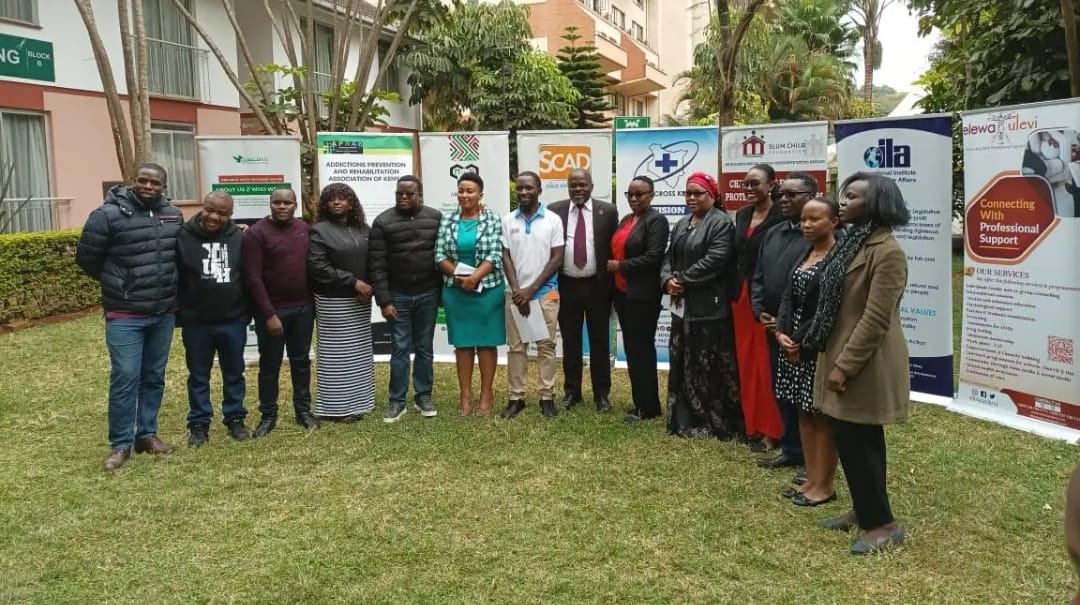Civil society organizations, child rights advocates, and public health professionals have welcomed the newly launched National Policy for the Prevention, Management and Control of Alcohol, Drugs and Substance Abuse (2025), describing it as a crucial step in tackling Kenya’s escalating alcohol crisis.
In a joint statement issued in Nairobi, and signed by Kenya Blue Cross, the Kenya Alliance Against Alcohol and Drug Abuse, the Kenya Girl Guides Association, the International Institute for Legislative Affairs, the Non-Communicable Diseases Alliance-Kenya, among others, the groups warned that alcohol misuse has become a national problem with devastating social and economic consequences.
“Alcohol is driving a health crisis that is destroying Kenya’s productivity and national wellbeing. This policy is about the people, not profits,” the statement read.
The organizations cited growing cases of addiction, domestic violence, road crashes, and declining productivity linked to alcohol consumption. They noted that one in every eight Kenyans consumes alcohol, while one in twenty struggles with alcohol addiction—costing families thousands of shillings in treatment and pushing many deeper into poverty.
At the Miritini Rehabilitation Centre in Mombasa, treatment for alcohol use disorder costs Ksh 55,000 for three months. In private facilities, fees range from Ksh 120,000 to Ksh 1 million, excluding aftercare. Nationwide, the estimated annual cost of treating alcohol use disorders is Ksh 74 billion, making recovery unaffordable for most Kenyans.
Alcohol misuse is also strongly linked to digestive disorders (21%), cardiovascular diseases (19%), liver disease, cancers, diabetes complications, and mental health disorders. Beyond health impacts, it fuels gender-based violence, child abuse, road accidents, and workplace absenteeism.
In Kajiado, studies show that more than half (54.4%) of men and women have been assaulted by someone under the influence of alcohol, while in Embu and Machakos, 56% of women and girls reported being violated by a drunk man.
The 2025 policy outlines several bold measures to reverse these trends. Among its proposals is raising the minimum legal drinking age from 18 to 21, a move backed by scientific evidence that delaying alcohol use lowers the risk of addiction, impaired judgment, and long-term brain damage. Even where enforcement is imperfect, research shows that raising the legal age of access reduces risky drinking, injuries, and deaths among young people.
The policy also seeks to curb the influence of alcohol marketing by restricting advertising, promotions, and sponsorships—especially in schools, youth events, and digital platforms where young people are heavily exposed. Another key focus is on creating alcohol-free environments for children and youth to reduce exposure, limit temptation, and promote healthier social norms. Advocates argue that such measures would allow young people to thrive without the pressure or fear of alcohol-related harm.
While acknowledging that the policy is not a “silver bullet,” the civil society coalition stressed that it represents an essential safety net that can save lives and reduce harm. They dismissed claims from some quarters that implementation could cost Kenya up to 13 million jobs, insisting that the human, social, and economic costs of alcohol far outweigh industry concerns.
“What about the 1.36 million Kenyans already struggling with alcohol use disorders? Or the children dropping out of school because of parental drinking? Or the women and girls subjected to violence at the hands of intoxicated partners?” the statement posed.
The groups urged the government to move quickly in turning the policy into law, with sufficient resources dedicated to prevention, treatment, enforcement, and inter-agency coordination. They called on Parliament to ensure health-driven debates and to resist lobbying from the alcohol industry. County governments, they added, must strictly enforce zoning and licensing rules while reinvesting license fees into community programs that support prevention, treatment, and rehabilitation.
They further appealed to parents, youth, faith leaders, and community groups to mobilize support for the policy by creating alcohol-free spaces and strengthening local support networks. Media houses were urged to report responsibly and elevate lived experiences while countering misinformation. The private sector, the coalition concluded, has a role to play by investing in safe recreational alternatives and in developing non-alcoholic products.
